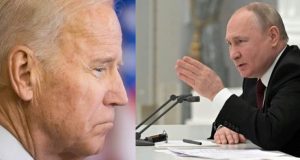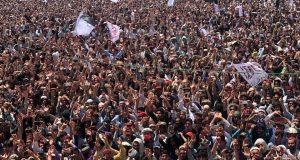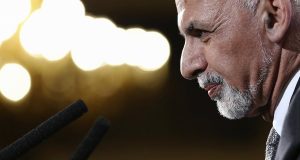 BY MUHAMMAD ZUBAIR: In the aftermath of Naqib’s extra-judicial murder and the spontaneous emergence of Pashtun protests organized by youngsters against the state oppression, some friends have raised important questions: For example, they ask: how could Pashtuns be organized against state oppression if the mainstream political parties, i.e, PkMAP and ANP are sidelined, whose political leadership is being ‘unfortunately’ discredited by ‘Pashtun intellectuals’; how these disorganized, scattered, reactionary, ideology-less, and party-less protests by Pashtuns could be sustained and prevented from dying; and, how these scattered protests be channelized and mobilized at larger scale without the help of traditional political parties.
BY MUHAMMAD ZUBAIR: In the aftermath of Naqib’s extra-judicial murder and the spontaneous emergence of Pashtun protests organized by youngsters against the state oppression, some friends have raised important questions: For example, they ask: how could Pashtuns be organized against state oppression if the mainstream political parties, i.e, PkMAP and ANP are sidelined, whose political leadership is being ‘unfortunately’ discredited by ‘Pashtun intellectuals’; how these disorganized, scattered, reactionary, ideology-less, and party-less protests by Pashtuns could be sustained and prevented from dying; and, how these scattered protests be channelized and mobilized at larger scale without the help of traditional political parties.
My response:
First, no doubt political parties are the vehicles for mass organization and mobilization. Their leaders are supposed to be the political teachers of those who they claim to lead. However, established political parties and its top leadership are always vulnerable to manipulation and cooperation, either due to threats or temptations, or both – especially in an oppressive state like Pakistan. But when political parties and their leaders fail their constituents – for whatever reason – a counter-elite class emerges from the masses to fill the political vacuum. As we can see there are numerous new faces of youngsters (like Manzoor Ahmad Pashteen, Hayat Preghal ) who are at the forefront of the current political movement, involved in organizing and mobilizing the masses. Look at their demands. They are raising all those issues on which the mainstream political parties are (or have been made to remain) silent. The very reason for the spontaneous emergence of these smaller scale movements is that the mainstream political parties have left the political vacuum. One of the greatest political benefits of the emergence of the counter-elites and the movement they lead is that they put pressure on the traditional political parties and their leadership, who are forced to leave the policy of indifference. So far, the political-economic cost-benefit analysis of the Pashtun nationalist leaders has led them to remain tightlipped on the oppressive policies of the state against Pashtuns (to which this movement is a reaction). They are till now ready to pay the political costs of losing the sympathy of their Pashtun base (short of political death) in order to protect themselves against the oppressive state. However, the emergence of counter-elites and spontaneous political movements (like the present one) put these parties and their leadership in a very tight spot, especially when they are confronted with making a stark choice of either continuing to take the side of the oppressive state or face an imminent political death. To avoid the second scenario, they will be forced to voice and mainstream the political grievances and demands of their base. In that sense, these apparently disorganized and spontaneous movements and the emerging counter-elite play an important role in keeping the traditional political parties on a tightrope. It is therefore incorrect to suggest that only political parties are the vehicles of organization and mobilization. Look at the civil rights movement in the USA in the 1950s-70s. It was not led by a single mainstream political party by many smaller organizations like NAACP, MLK’s, Malcolm X, Black Panther etc, and political parties were forced to get on board.
Second, the current ongoing spontaneous protests may appear in disarray and disorganized, but behind the veneer of apparent chaos, there is a common political principle that weaves them into one movement: the commonality of their grievances and their reaction against and demands on the oppressive state. When a people endure oppression for a long time, then Rosa Park’s refusal to sit in the back of the bus or Naqib’s murder just prove the proverbial last straw on camel’s back. The lid over the volcano is removed and the pent-up anger finds its way out. Now, look at the statement of the apparently illiterate father of Naqib. He pointed out to the same organizing principle. He said that if the murder of his son provided an opportunity to Mashud and other Pashtuns to ‘protect’ themselves against the oppression of the state, he would think his murder was not wasted. In other words, he does not take the murder of his son as an individual and private grievance but is trying to make it part of similar and larger grievances that Pashtuns are facing at the hands of the oppressive state. Most importantly, he said that Pashtuns do not have weapons or anything else but to organize, protest and make noise against the state oppression, and that is the only way to protect themselves against those who have guns in their hands. He mocked the Mullahs who have recently issued a Fatwa against the suicide bombing. He questioned the delayed issuance of the fatwa, saying where were these Mullahs when all suicide bombers blew themselves and others. He also questioned why the same Mullah brigade does not issue a fatwa against the extra-judicial killing (pointing to the unholy alliance between oppressive state and Mullah!). This is extremely significant, this is nothing but an organizing principle.
Third, it is also incorrect to suggest that the present movement is without any ideological basis or direction. Yesterday, Dr. Said Alam Mahsud and his friends organized a committee that has clear objectives to archive (I am going to share the video in the comments section), Mahsud Tahaffuz Movement and other like organizations also have similar and clear objectives: protest against extra-judicial murders of Pashtuns; compilation of lists of Pashtun missing person in oppressive state’s custody (alive or killed); the issue of land-mines left by the Pak army which have blown up hundreds of innocent children in FATA; night raids against and unlawful searches of people in FATA; breaking the state promoted stereotypes of Pashtuns showing them as terrorists; refusing to become Shuhada any more, etc. I think, these are the immediate issues that the Pashtuns of the tribal belt (and overall) are facing. The mainstream political parties are silent on these issues. They have some other priorities: ‘saving (NS’s) democracy’ and ‘(Punjab’s) constitution’. The commonality of these problems has brought unity of thought/ideology to this movement, which might, in turn, possibly bring unity to their action too. The mainstream Pashtun political parties cannot remain affected by all this. They have to get onboard on these issues or wither away and thrown into the dustbin of history.
Lastly, to those who point out to the spontaneity and short-lived life of these movements, springing up after such incidents and then immediately dying, I have to say this: granted, this or that event may die in the short term, but rest assured, the oppression of the state is so well entrenched and its oppressive machines runs to such an extent on the blood of ethnonational minorities that it will keep on churning out new reasons for Pashtuns and other ethnonational groups to organize. And organize we will. We shall overcome.
By Muhammad Zubair Khan
The writer hails from South Waziristan and is currently completing PhD studies from Indiana University. He can be reached at mzubair@indiana.edu
 Pashtun Times Latest News
Pashtun Times Latest News



